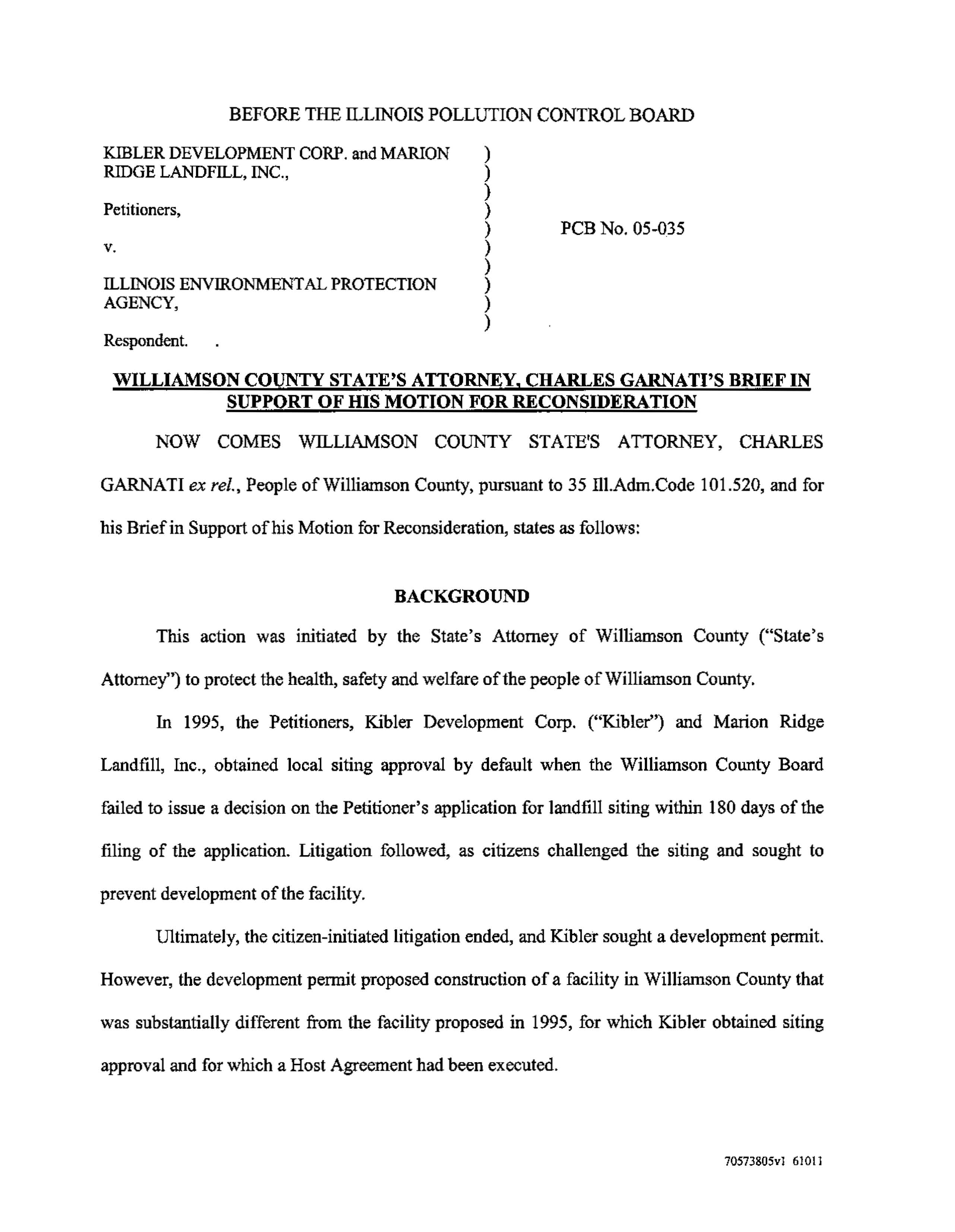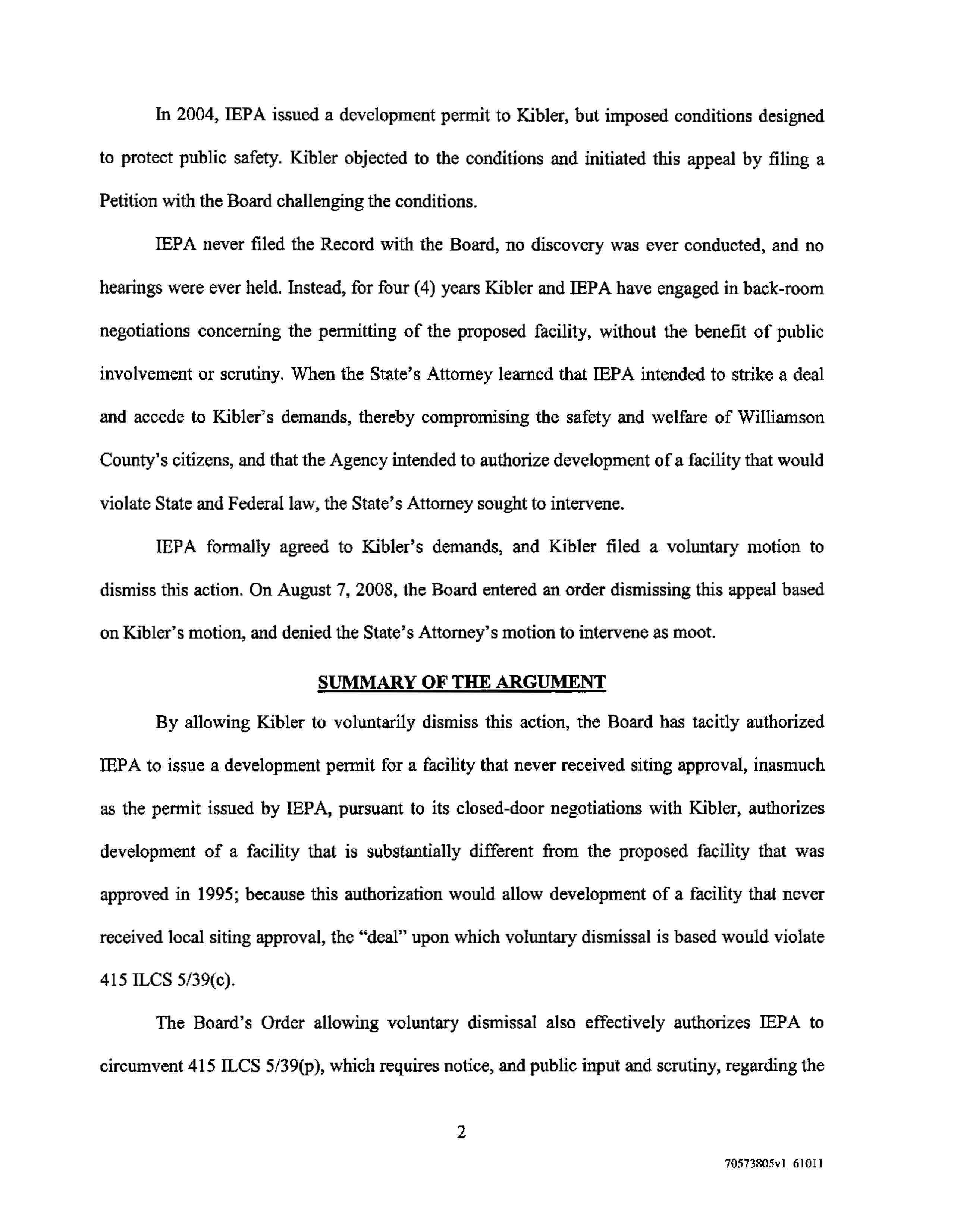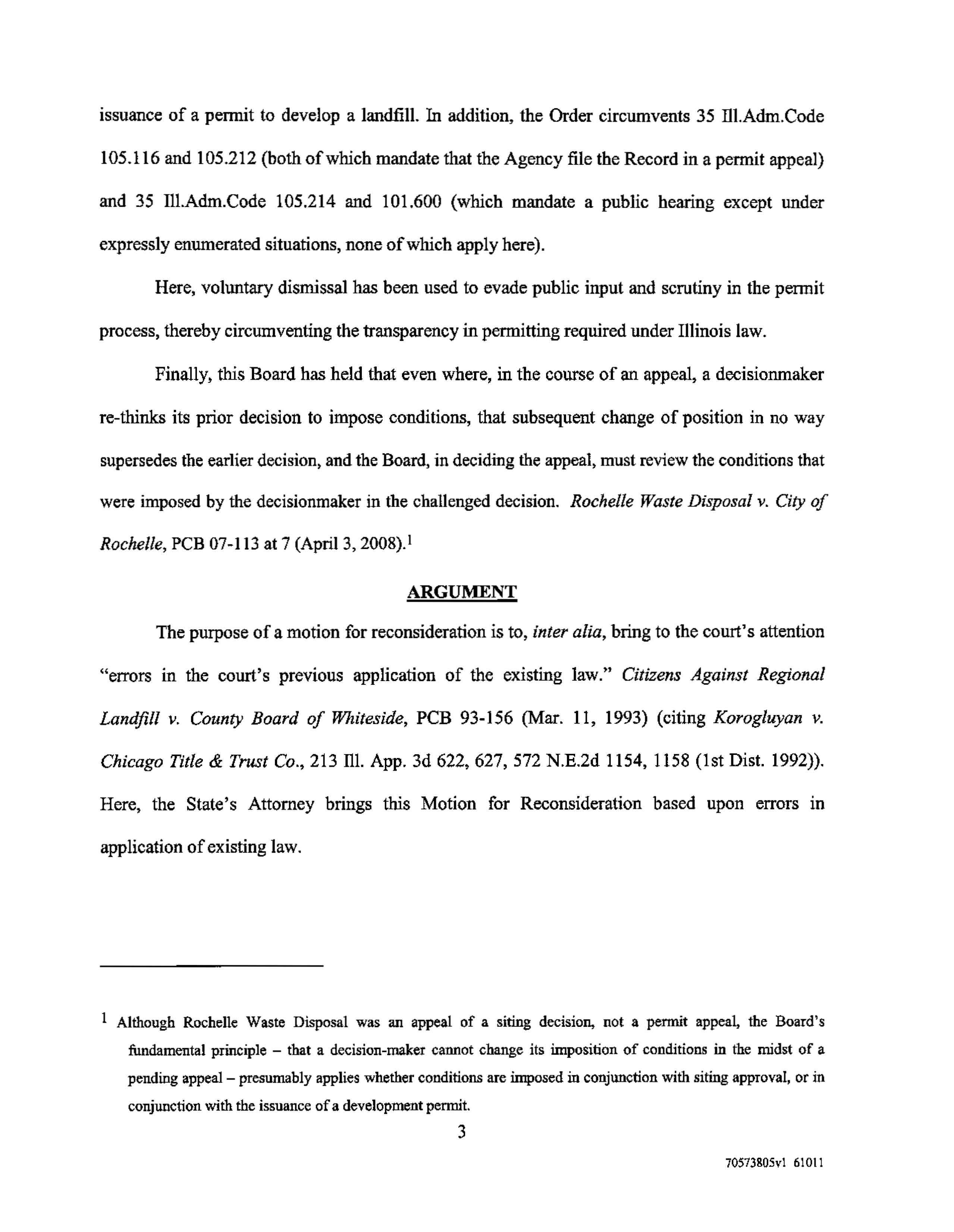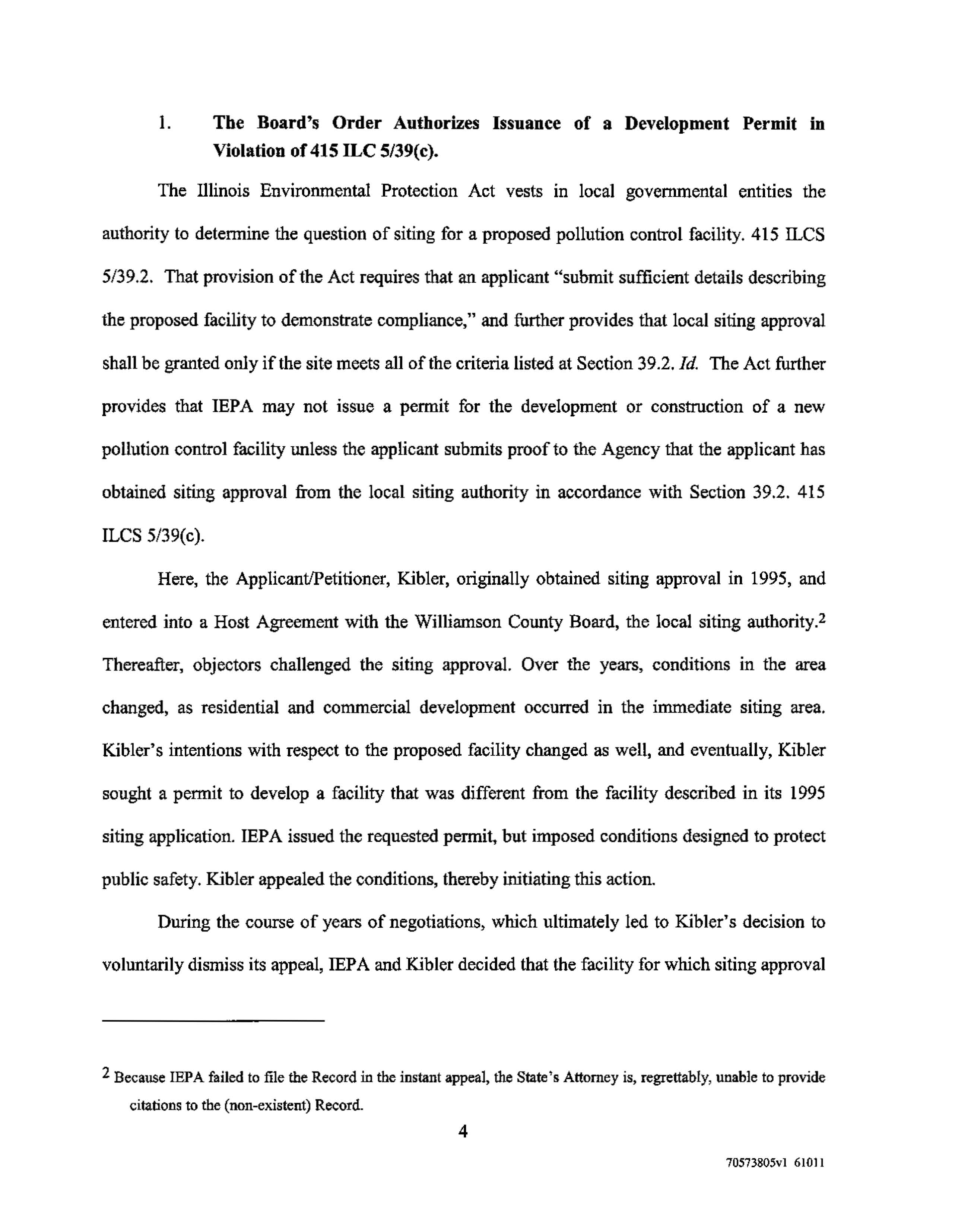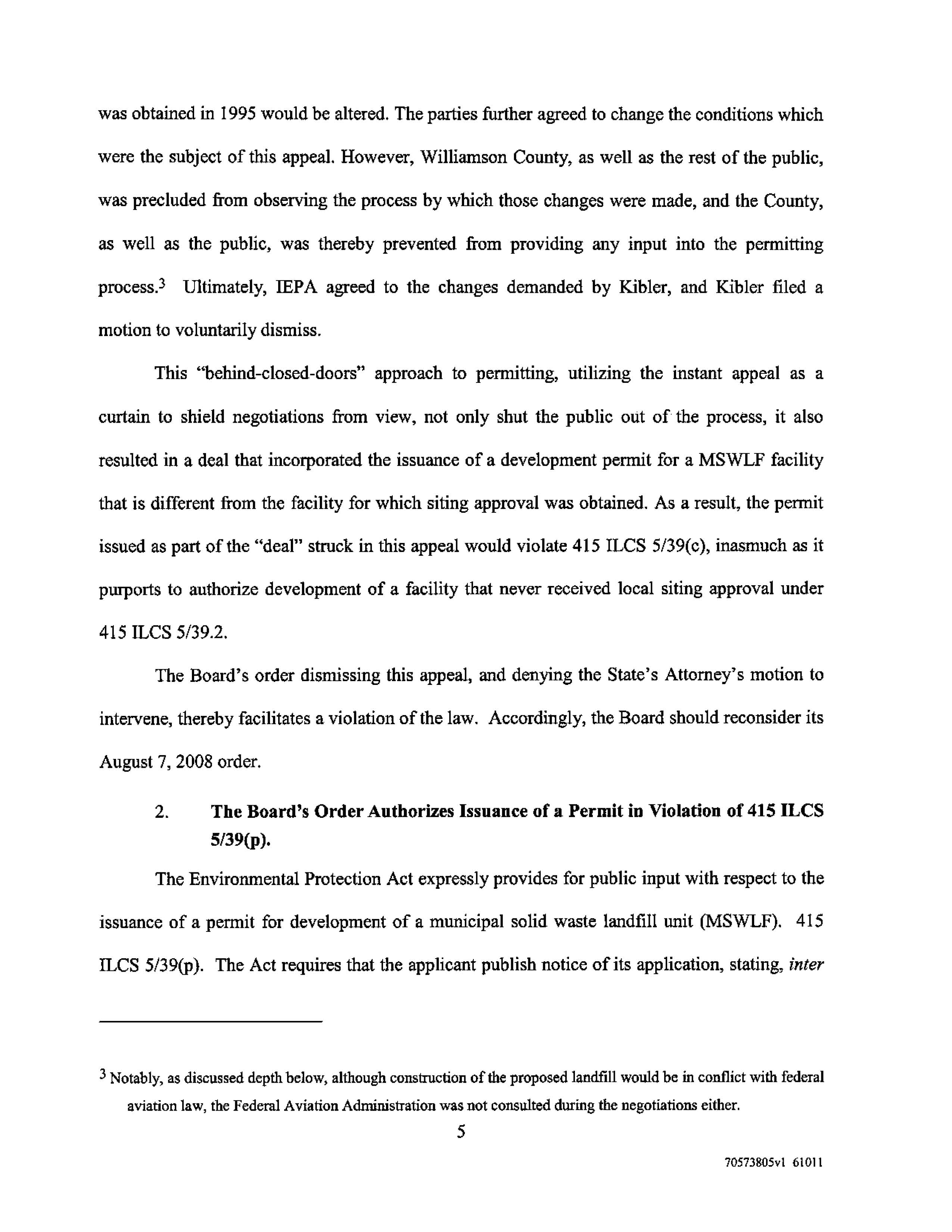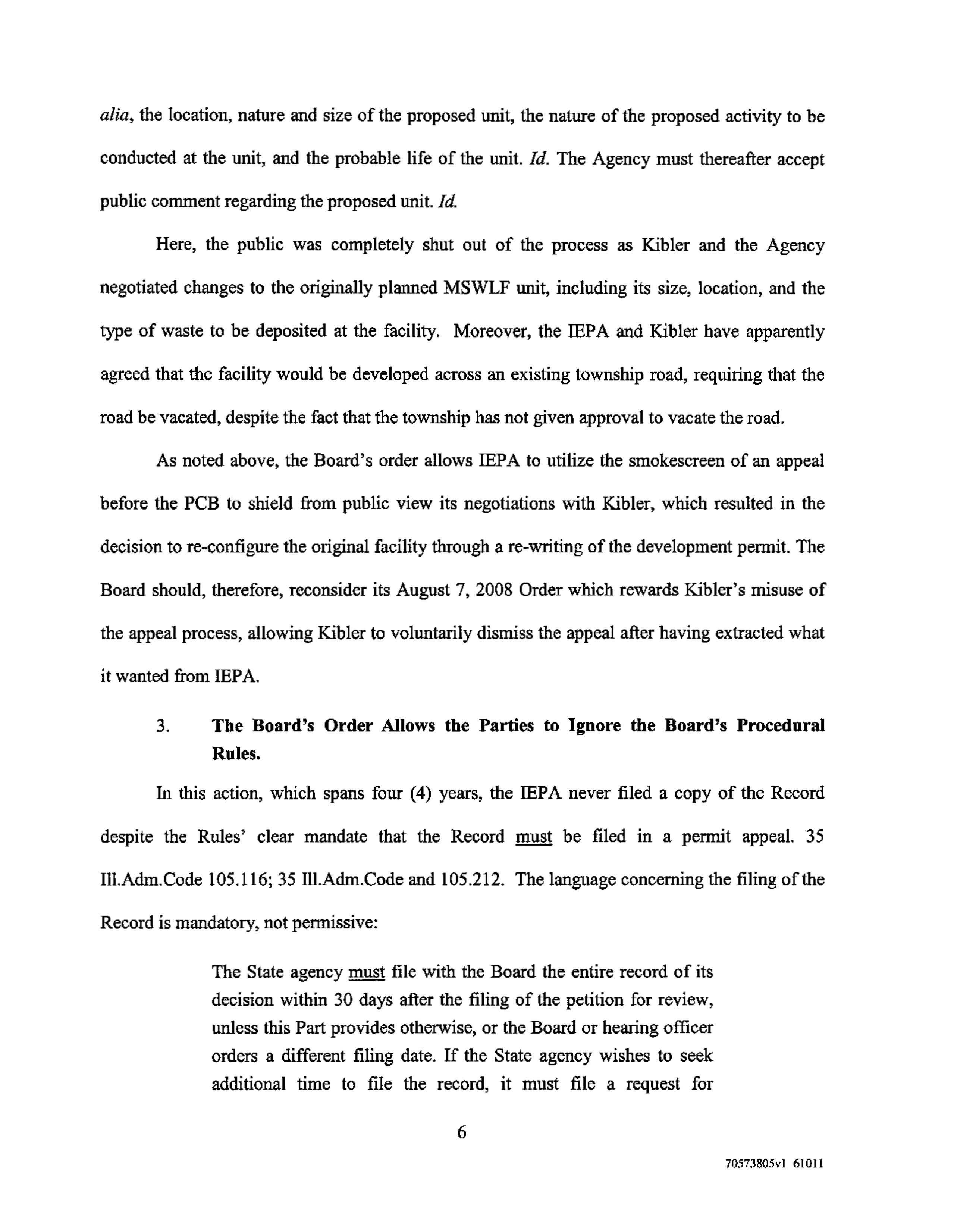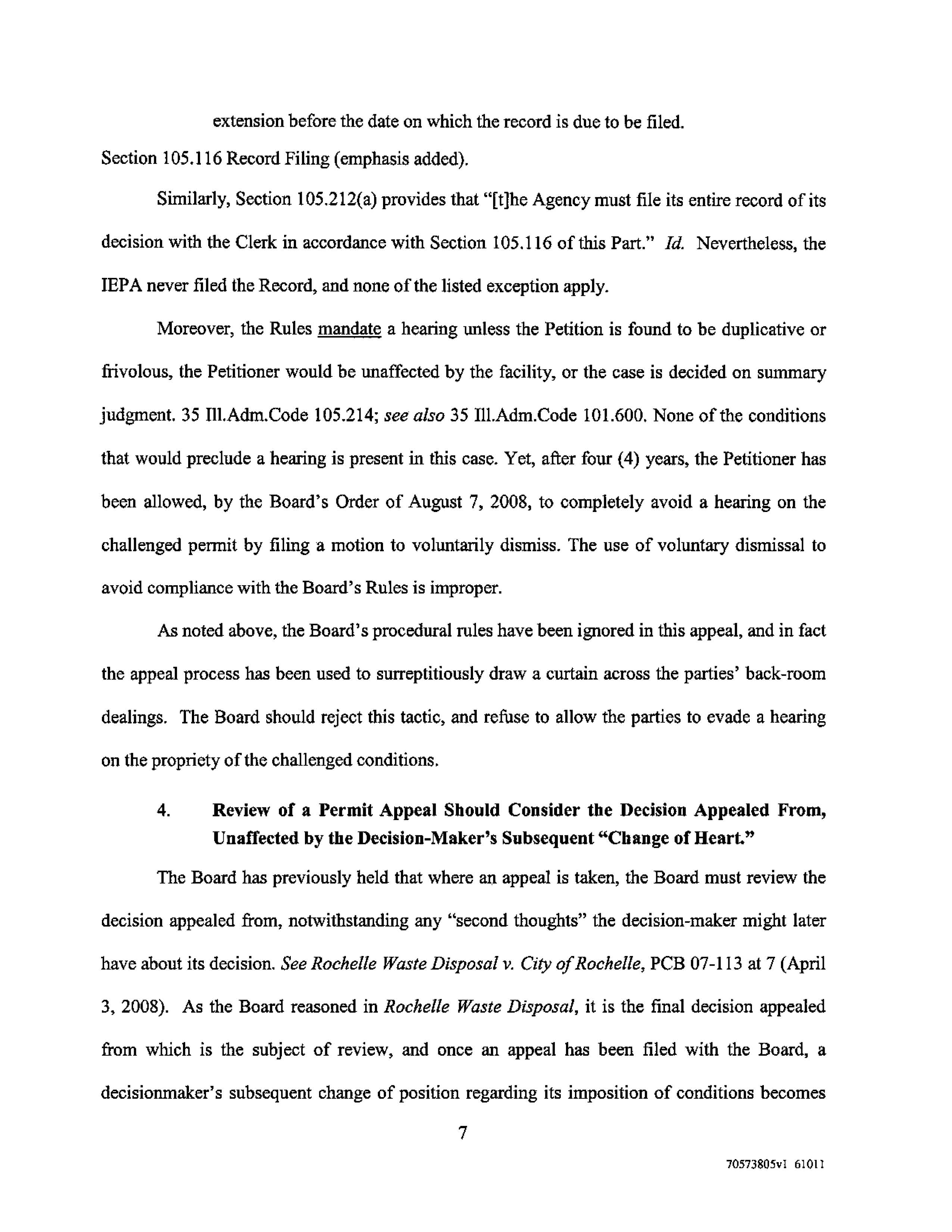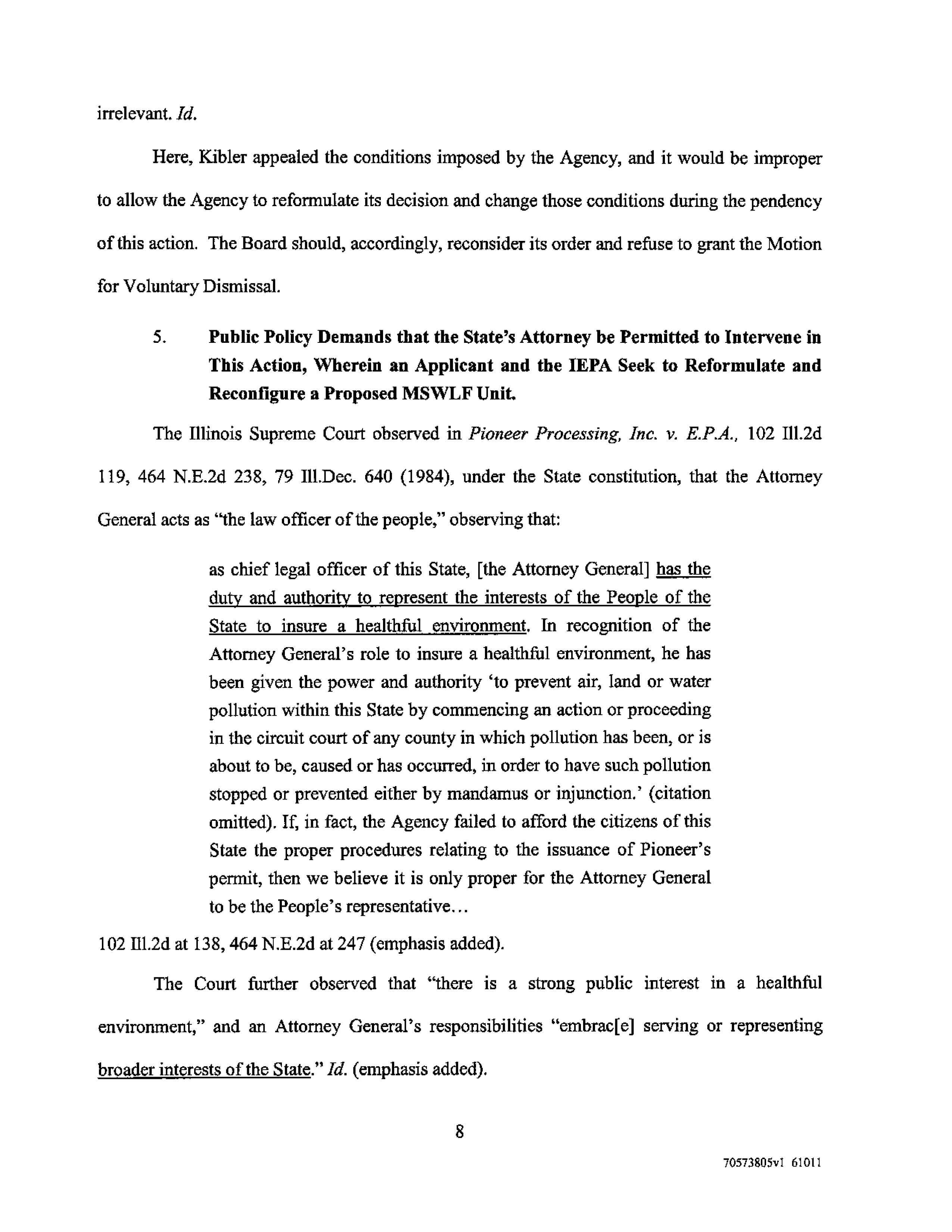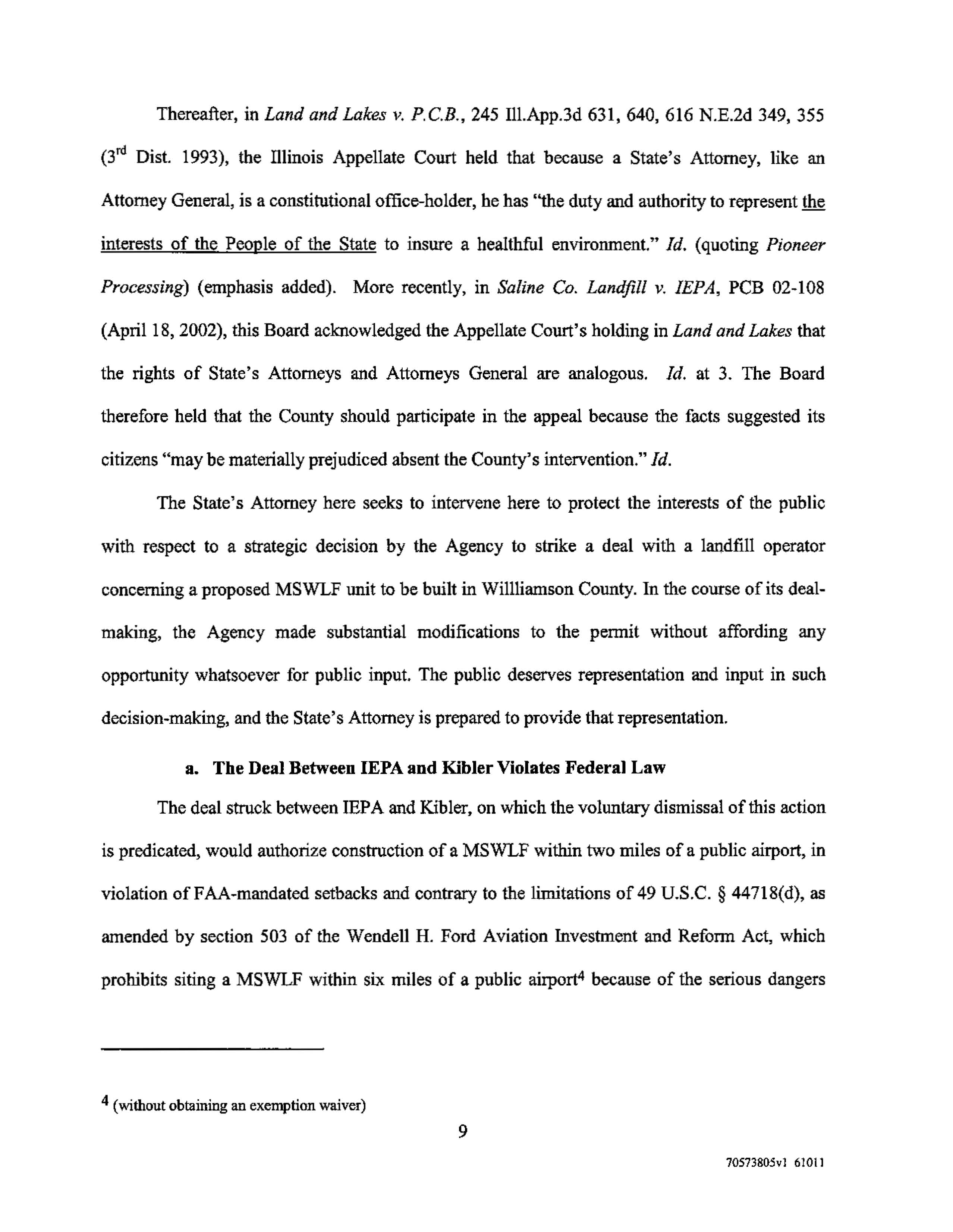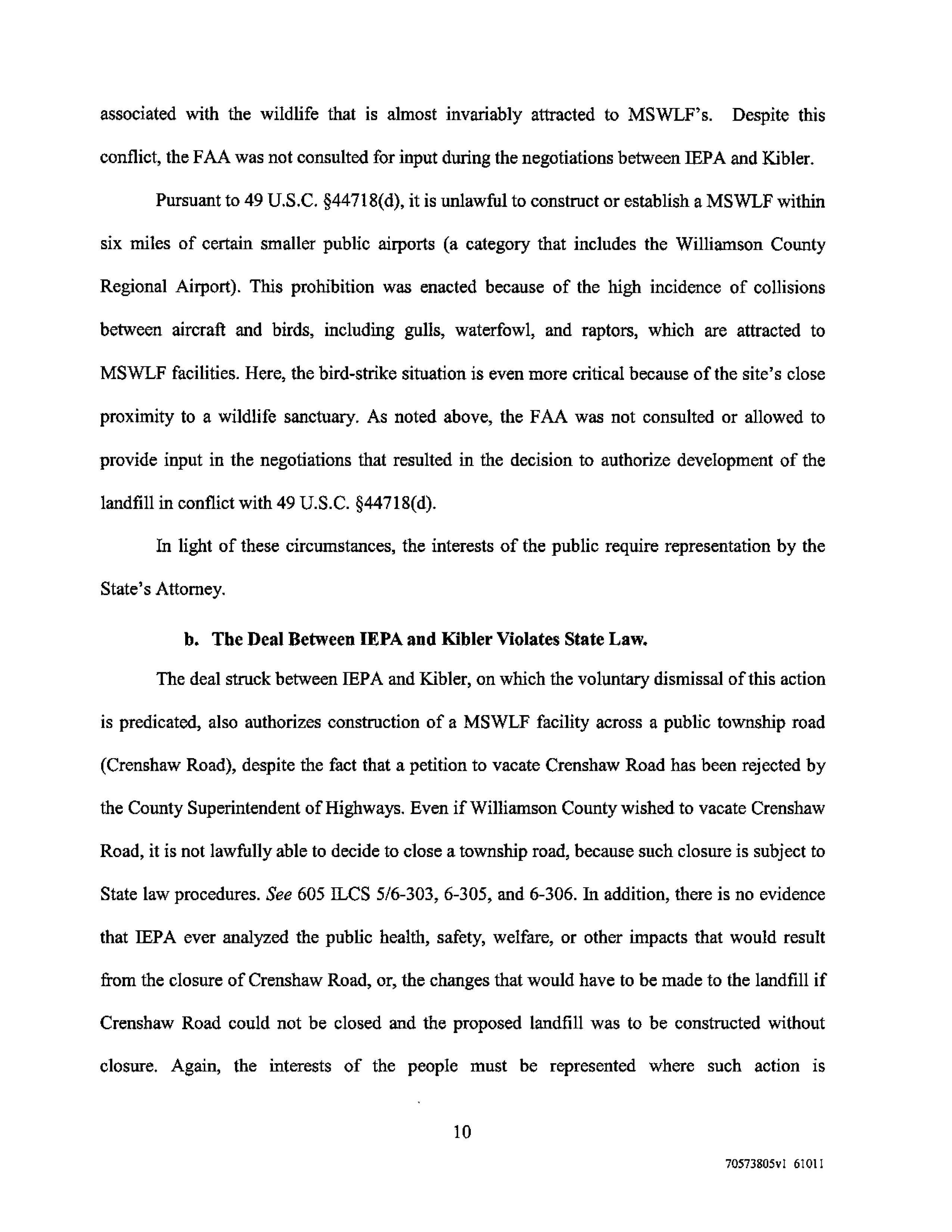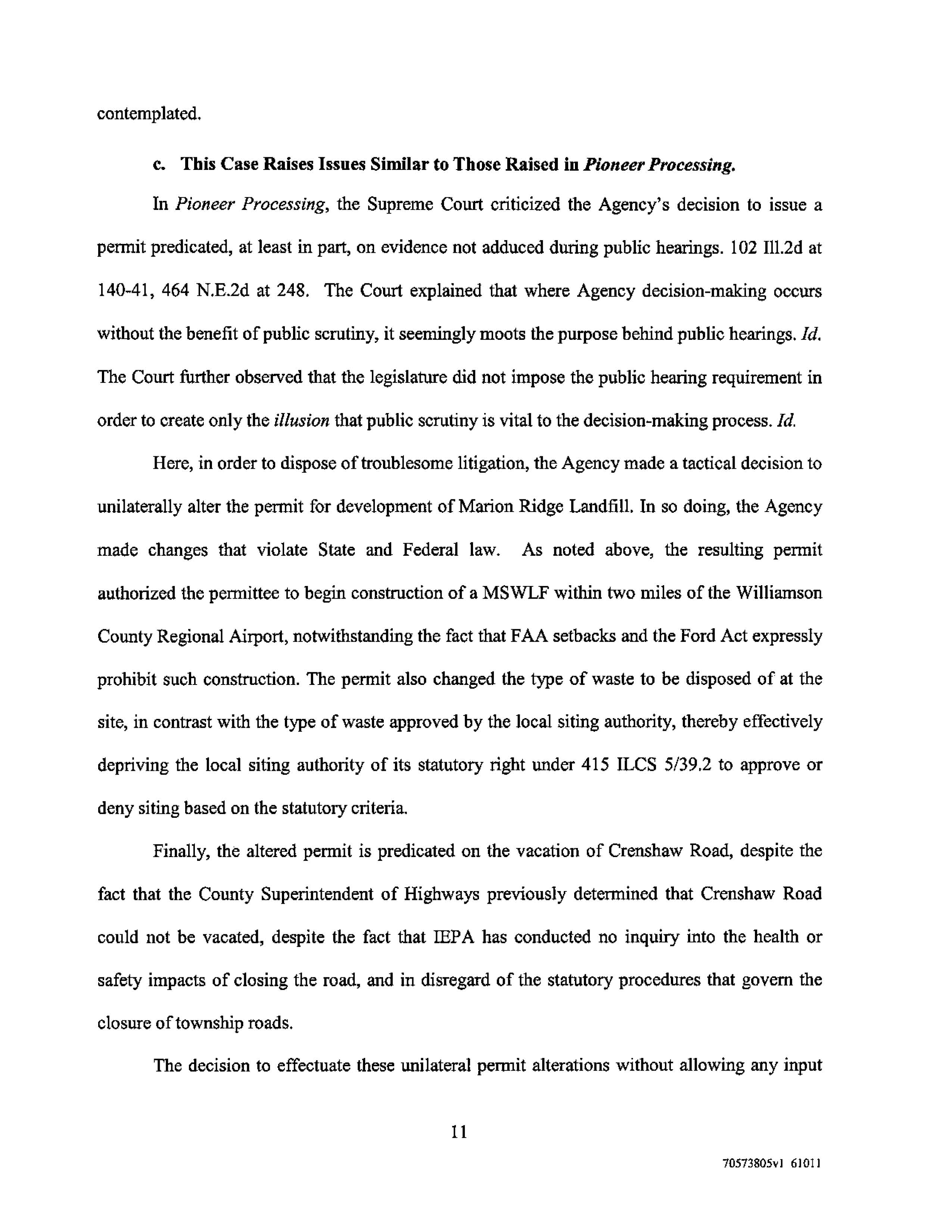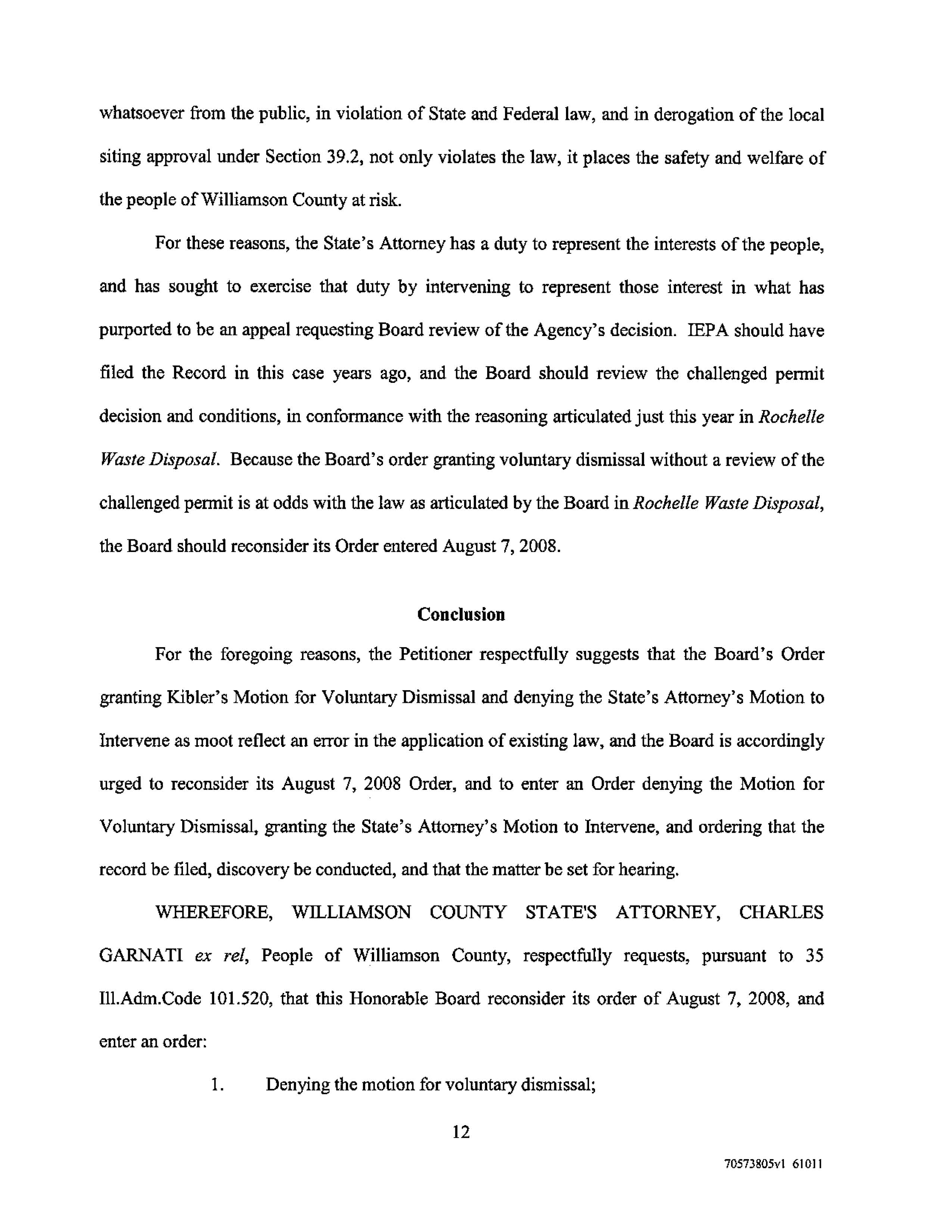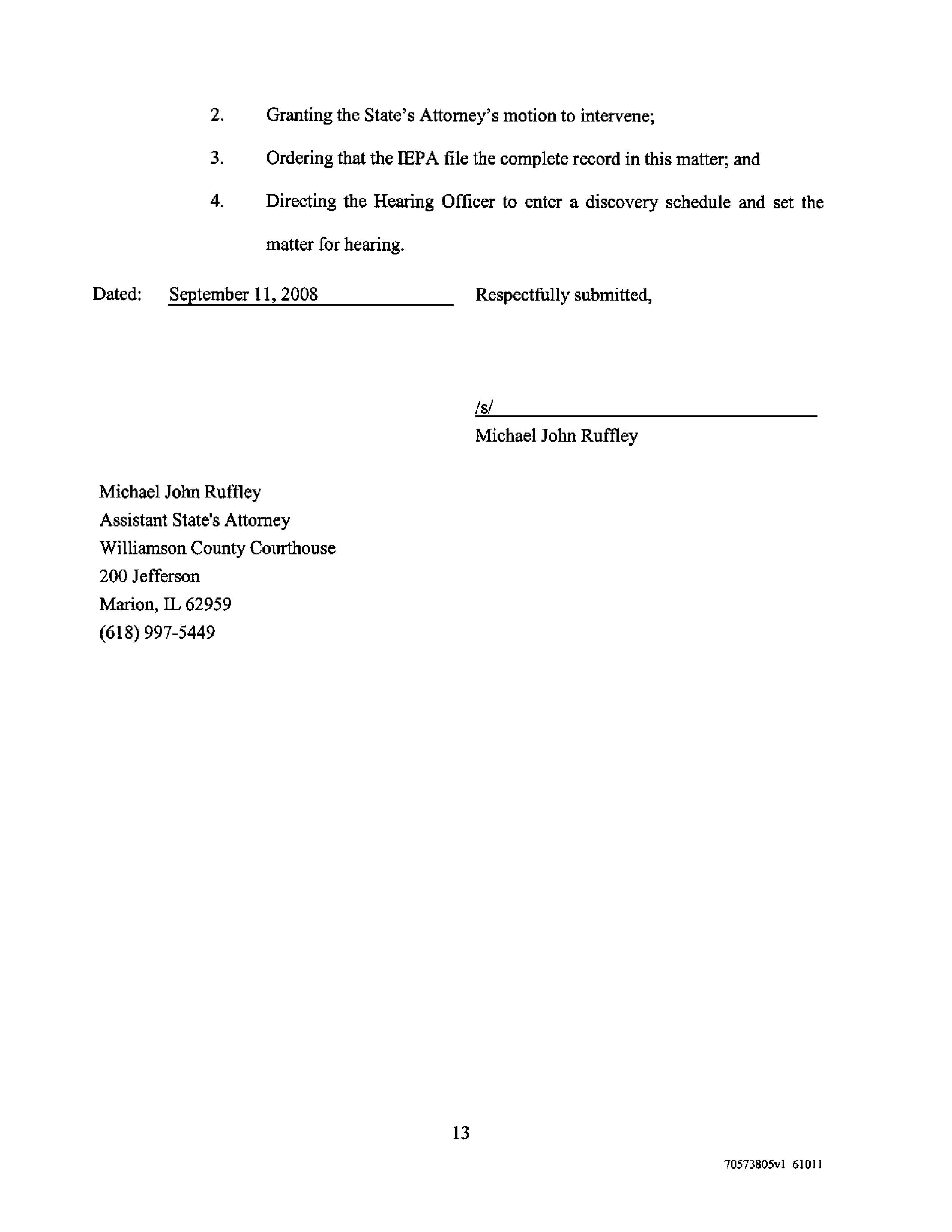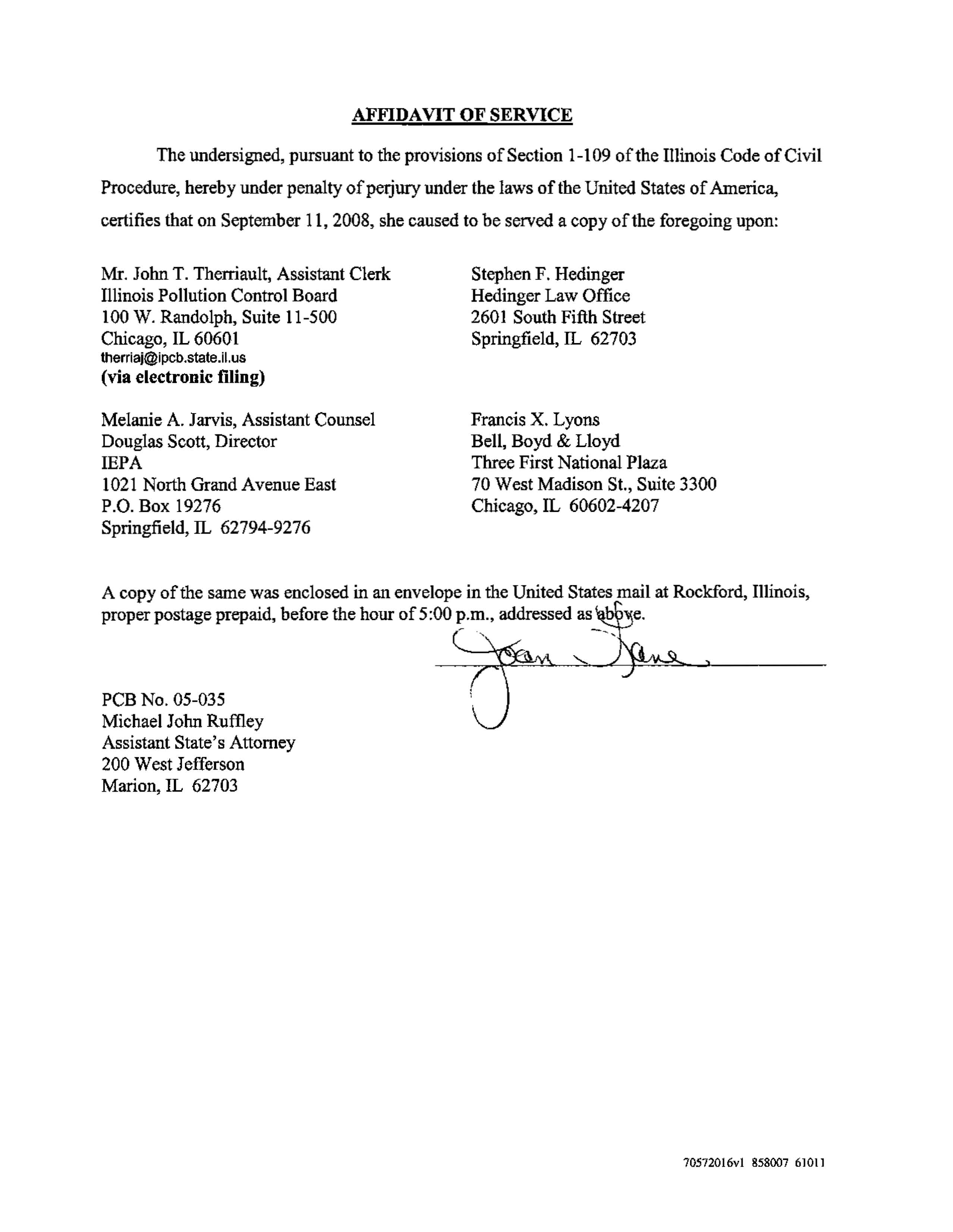Electronic Filing - Received, Clerk's Office, September 11, 2008
BEFORE THE ILLINOIS POLLUTION CONTROL BOARD
KIBLER DEVELOPMENT CORPORATION
and MARION RIDGE LANDFILL, INC...
Petitioners,
v.
ILLINOIS ENVIRONMENTAL
PROTECTION AGENCY..
Respondents.
)
)
)
)
)
)
)
)
)
)
)
PCB No. PCB 05-35
NOTICE OF FILING
TO: SEE ATTACHED SERVICE LIST
PLEASE TAKE NOTICE that on September
11, 2008, we electronically filed with the
Clerk of the Illinois Pollution Control Board, Williamson County State's Attorney, Chares
Garnati's Brief
in Support of His Motion for Reconsideration, copies of which are attached
hereto and hereby served upon you.
Dated:
September
11, 2008
Michael J
o1m Rumey
Assistant State'sAttorney
200 West Jefferson
Marion,IL 62703
Respectfully submitted,
On
behalf of Williamson County State's
Attorney, Charles Gamati
lsi
Michael Jo1m Rumey
One of Its Attorneys
7057202Jvl 858007 61011
BEFORE THE ILLINOIS POLLUTION CONTROL BOARD
KIBLER DEVELOPMENT CORP. and MARION
RIDGE LANDFILL, INC.,
Petitioners,
v.
ILLINOIS ENVIRONMENTAL PROTECTION
AGENCY,
Respondent.
)
)
)
)
)
)
)
)
)
)
PCB No.
05~035
WILLIAMSON COUNTY STATE'S ATTORNEY, CHARLES GARNATI'S BRIEF IN
SUPPORT OF HIS MOTION FOR RECONSIDERATION
NOW COMES WILLIAMSON COUNTY STATE'S ATTORNEY, CHARLES
GARNATI
ex rei.,
People of Williamson County, pursuant to 35 TIl.Adm.Code 101.520, and for
his
Briefin Support ofhis Motion for Reconsideration, states as follows:
BACKGROUND
This action was initiated by the State's Attorney of Williamson County ("State's
Attorney") to protect the health, safety and welfare
ofthe people of Williamson County.
In 1995, the Petitioners, Kibler Development Corp. ("Kibler") and Marion Ridge
Landfill, Inc., obtained local siting approval
by default when the Williamson County Board
failed to issue a decision
on the Petitioner's application for landfill siting within 180 days of the
filing of the application. Litigation followed, as citizens challenged the siting and sought to
prevent development
of the facility.
LTItimately, the citizen-initiated litigation ended, and Kibler sought a development permit.
However, the development permit proposed construction
of a facility
in
Williamson County that
was substantially different from the facility proposed in 1995, for which Kibler obtained siting
approval and for which a Host Agreement
had been executed.
70573805v} 61011
In
2004, IEPA issued a development permit to Kibler
t
but imposed conditions designed
to protect public safety. Kibler objected to the conditions and initiated this appeal by filing a
Petition with the Board challenging the conditions.
IEPA never filed the Record with the Board, no discovery was ever conducted
t
and no
hearings were ever held. Instead
t
for four (4) years Kibler and !EPA have engaged in back-room
negotiations concerning the pennitting
of the proposed facility, without the benefit of public
involvement or scrutiny. When the State's Attorney learned that IEPA intended to strike a deal
and accede
to Kibler's demands, thereby compromising the safety and welfare of Williamson
County'scitizens, and that the Agency intended to authorize development
of a facility that would
violate State and Federa1law, the State'sAttorney sought to intervene.
IEPA fonnally agreed to Kibler's demands, and Kibler filed a voluntary motion
to
dismiss this action. On August 7,2008, the Board entered an order dismissing this appeal based
on Kibler'smotion, and denied the State'sAttorney'smotion to intervene as moot.
SUMMARY
OF THE ARGUMENT
By allowing Kibler to voluntarily dismiss this action, the Board has tacitly authorized
IEPA to issue a development pennit for a facility that never received siting approval, inasmuch
as the permit issued by IEPA, pursuant to its closed-door negotiations with Kibler, authorizes
development
of a facility that is substantially different from the proposed facility that was
approved in 1995; because this authorization would allow development
of a facility that never
received local siting approval, the "deal" upon which voluntary dismissal is based would violate
415 ILCS 5/39(c).
The Board's Order allowing voluntary dismissal also effectively authorizes IEPA
to
circumvent 415 ILCS 5/39(P), which requires notice, and public input and scrutiny, regarding the
2
70573805v! 61011
issuance of a pennit to develop a landfill.
In
addition, the Order circumvents 35 1ll.Adm.Code
105.116 and 105.212 (both
ofwhich mandate that the Agency file the Record in a permit appeal)
and 35 Ill.Adm.Code 105.214 and 101.600 (which mandate a public hearing except under
expressly enumerated situations,
none ofwhich apply here).
Here, voluntary dismissal has been used to evade public input and scrutiny in the permit
process, thereby circumventing the transparency
in
permitting required under Illinois law.
Finally, this
Board has held that even where, in the course of an appeal, a decisionmaker
re-thinks its prior decision to impose conditions, that subsequent change of position in no way
supersedes the earlier decision, and the Board, in deciding the appeal, must review the conditions that
were imposed
by the decisionmaker in the challenged decision.
Rochelle Waste Disposal v. City of
Rochelle,
PCB 07-113 at 7 (April 3, 2008).1
ARGUMENT
The purpose of a motion for reconsideration is to,
inter alia,
bring to the court's attention
"errors
in the court's previous application of the existing law."
Citizens Against Regional
Landfill
v. County Board of Whiteside,
PCB 93-156 (Mar. 11, 1993) (citing
Korogluyan
v.
Chicago Title
&
Trust Co.,
213
m.
App. 3d 622, 627, 572 N.E.2d 1154, 1158 (1st Dist. 1992».
Here, the State's Attorney brings this Motion for Reconsideration based upon errors
in
application of existing law.
1 Although Rochelle Waste Disposal was an appeal of a siting decision, not a pennit appeal, the Board's
fundamental principle - that a decision-maker cannot change its imposition
of conditions
in
the midst of a
pending appeal - presumably applies whether conditions are imposed
in
conjunction with siting approval, or in
conjunction with the issuance
of a development pennit.
3
70573S05v1 61011
1.
The Board's Order Authorizes Issuance of a Development Permit in
Violation of 415 ILC 5/39(c).
The lllinois Environmental Protection Act vests in local governmental entities the
authority to detennine the question
of siting for a proposed pollution control facility. 415 ILCS
5/39.2. That provision of the Act requires that an applicant "submit sufficient details describing
the proposed facility to demonstrate compliance," and further provides that local siting approval
shall be granted only if the site meets all of the criteria listed at Section 39.2.
ld.
The Act further
provides that IEPA may not issue a permit for the development
or construction of a new
pollution control facility unless the applicant submits
proofto the Agency that the applicant has
obtained siting approval from the local siting authority
in
accordance with Section 39.2. 415
ILCS 5/39(c).
Here, the ApplicantJPetitioner, Kibler, originally obtained siting approval in 1995, and
entered into a Host Agreement with the Williamson County Board, the local siting authority.
2
Thereafter, objectors challenged the siting approval. Over the years, conditions in the area
changed, as residential and commercial development occurred in the immediate siting area.
Kibler's intentions with respect to the proposed facility changed as well, and eventually, Kibler
sought a pennit to develop a facility that was different from the facility described
in its 1995
siting application. IEPA issued the requested permit, but imposed conditions designed to protect
public safety. Kibler appealed the conditions, thereby initiating this action.
During the course
of years of negotiations, which ultimately led to Kibler's decision to
voluntarily dismiss its appeal, IEPA and Kibler decided that the facility for which siting approval
2 Because IEPA failed to file the Record
in
the instant appeal,
the
State'sAttorney is, regrettably, unable to provide
citations to the (non-existent) Record.
4
70573805vl 61011
was obtained in 1995 would be altered. The parties further agreed to change the conditions which
were the subject of this appeal. However, Williamson County, as well as the rest of the public,
was precluded from observing the process by which those changes were made, and the County,
as well as the public, was thereby prevented from providing any input into the permitting
process.
3
Ultimately, IEPA agreed to the changes demanded by Kibler, and Kibler filed a
motion to voluntarily dismiss.
This "behind-closed-doors" approach to permitting, utilizing the instant appeal as a
curtain to shield negotiations from view, not only shut the public out
of the process, it also
resulted in a deal that incorporated the issuance
of a development permit for a MSWLF facility
that is different from the facility for which siting approval was obtained. As a result, the pennit
issued as part
of the "deal" struck in this appeal would violate 415 ILCS 5/39(c), inasmuch as it
purports to authorize development
of a facility that never received local siting approval under
415 ILCS
5/39.2.
The Board's order dismissing this appeal, and denying the State's Attorney's motion to
intervene, thereby facilitates a violation of the law. Accordingly, the Board should reconsider its
August 7, 2008 order.
2.
The Board's Order Authorizes Issuance of a Permit in Violation of 415 ILCS
5/39(p).
The Environmental Protection Act expressly provides for public input with respect to the
issuance
of a permit for development of a municipal solid waste landfill unit (MSWLF). 415
ILCS
5139(P).
The Act requires that the applicant publish notice of its application, stating,
inter
3 Notably, as discussed depth below, although construction of the proposed landfill would be
in
conflict with federal
aviation
law, the Federal Aviation Administration was not consulted during the negotiations either.
5
70573805vl 61011
alia,
the location, nature and size of the proposed unit, the nature of the proposed activity to be
conducted at the unit, and the probable life of the unit.
ld.
The Agency must thereafter accept
public comment regarding the proposed unit.
ld.
Here, the public was completely shut out of the process as Kibler and the Agency
negotiated changes to the originally planned
MSWLF unit, including its size, location, and the
type
of waste to be deposited at the facility. Moreover, the IEPA and Kibler have apparently
agreed that the facility would be developed across an existing township road, requiring that the
road
be vacated, despite the fact that the township
has
not given approval to vacate the road.
As noted above, the
Board's order allows IEPA to utilize the smokescreen of an appeal
before the PCB to shield from public view its negotiations with Kibler, which resulted in the
decision to re-configure the original facility through a re-writing
of the development permit. The
Board should, therefore, reconsider its August 7, 2008 Order which rewards Kibler's misuse
of
the appeal process, allowing Kibler to voluntarily dismiss the appeal after having extracted what
it wanted from IEPA.
3.
The Board's Order Allows the Parties to Ignore the Board's Procedural
Rules.
In this action, which spans four (4) years, the IEPA never filed a copy of the Record
despite the Rules' clear mandate that the Record must
be filed in a permit appeal. 35
Ill.Adm.Code 105.116; 35 IlLAdm.Code and 105.212. The language concerning the filing of the
Record is mandatory, not pennissive:
The State agency must file with the Board the entire record
of its
decision within
30 days after the filing of the petition for review,
unless this Part provides otherwise,
or the Board or hearing officer
orders a different filing date.
If the State agency wishes to seek
additional time to file the record,
it must file a request for
6
70573805vl 61011
extension before the date on which the record is due to be filed.
Section 105.116 Record Filing (emphasis added).
Similarly, Section 105.212(a) provides that "[t]he Agency must file its entire record
of its
decision with the Clerk
in accordance with Section 105.116 of this Part."
ld.
Nevertheless, the
IEPA never filed the Record, and none
of the listed exception apply.
Moreover, the Rules mandate a hearing unless the Petition is found to be duplicative or
frivolous, the Petitioner would be unaffected
by the facility, or the case is decided on summary
judgment.
35 m.Adm.Code 105.214;
see also
35 Ill.Adm.Code 101.600. None of the conditions
that would preclude a hearing is present
in
this case. Yet, after four (4) years, the Petitioner has
been allowed, by the Board's Order
of August 7. 2008, to completely avoid a hearing on the
challenged permit by filing a motion to voluntarily dismiss. The use
of voluntary dismissal to
avoid compliance with the Board'sRules is improper.
As noted above, the Board'sprocedural rules have been ignored in this appeal, and in fact
the appeal process
has
been used to surreptitiously draw a curtain across the parties' back-room
dealings. The Board should reject this tactic, and refuse
to allow the parties to evade a hearing
on the propriety
of the challenged conditions.
4.
Review of a Permit Appeal Should Consider the Decision Appealed From,
Unaffected by the Decision-Maker's Subsequent "Cbange of Heart."
The Board
has
previously held that where an appeal is taken, the Board must review the
decision appealed from, notwithstanding any "second thoughts" the decision-maker might later
have about its decision.
See Rochelle Waste Disposal
v.
City ofRochelle,
PCB 07-113 at 7 (April
3, 2008). As the Board reasoned in
Rochelle Waste Disposal,
it is the final decision appealed
from which is the subject
of review, and once an appeal has been filed with the Board, a
decisionmaker's subsequent change
of position regarding its imposition of conditions becomes
7
7057J805vl 61011
irrelevant.
Id.
Here, Kibler appealed the conditions imposed by the Agency, and it would be improper
to allow the Agency to reformulate its decision and change those conditions during the pendency
of this action. The Board should, accordingly, reconsider its order and refuse to grant the Motion
for Voluntary Dismissal.
5.
Public Policy Demands that the State'sAttorney be Permitted to Intervene in
This Action, Wherein an Applicant and the IEPA Seek to Reformulate and
Reconfigure a Proposed MSWLF Unit.
The Illinois Supreme Court observed
in
Pioneer Processing, Inc.
v.
E.P.A.,
102 Ill.2d
119, 464 N.E.2d 238, 79 Ill.Dec. 640 (1984), under the State constitution, that the Attorney
General acts as ''thelaw officer
ofthe people," observing that:
as chief legal officer
of this State, [the Attorney General] has the
duty and authority to represent the interests
of the People of the
State to insure a healthful environment.
In
recognition of the
Attorney General's role to insure a healthful environment, he has
been given the power and authority
'to prevent air, land or water
pollution within this State
by commencing an action or proceeding
in the circuit court
of any county in which pollution has been, or is
about to be, caused
or has occurred, in order to have such pollution
stopped
or prevented either by mandamus or injunction.' (citation
omitted). If, in fact, the Agency failed to afford the citizens
of this
State the proper procedures relating to the issuance
of Pioneer's
permit, then we believe it is only proper for the Attorney General
to be the People'srepresentative
...
102 ll1.2d at 138,464 N.E.2d at 247 (emphasis added).
The Court further observed that "there is a strong public interest in a healthful
environment," and an Attorney General's responsibilities "embrac[
e] serving or representing
broader interests of the State."
[d.
(emphasis added).
8
70S7380Svl 61011
Thereafter, in
Land and Lakes
v.
P.C.B.,
245 Ill.App.3d 631, 640, 616 N.E.2d 349, 355
(3
rd
Dist. 1993), the lllinois Appellate Court held that because a State's Attorney, like an
Attorney General, is a constitutional office-holder, he has
'The
duty and authority to represent the
interests of the People of the State to insure a healthful environment."
Id.
(quoting
Pioneer
Processing)
(emphasis added). More recently, in
Saline Co. Landfill
v.
IEPA,
PCB 02-108
(April 18, 2002), this Board acknowledged the Appellate Court'sholding in
Land and Lakes
that
the rights
of State's Attorneys and Attorneys General are analogous.
Id.
at 3. The Board
therefore held that the County should participate in the appeal because the facts suggested its
citizens "may
be materially prejudiced absent the County'sintervention."
Id.
The State's Attorney here seeks to intervene here to protect the interests of the public
with respect to a strategic decision by the Agency to strike a deal with a landfill operator
concerning a proposed MSWLF unit to be built
in
Willliamson County. In the course of its deal-
making, the Agency made substantial modifications to the pennit without affording any
opportunity whatsoever for public input. The public deserves representation and input in such
decision-making, and the State'sAttorney is prepared to provide that representation.
a. The Deal Between IEPA and Kibler Violates Federal Law
The deal struck between IEPA and Kibler, on which the voluntary dismissal of this action
is predicated, would authorize construction
of a MSWLF within two miles of a public airport, in
violation
of FAA-mandated setbacks and contrary to the limitations of 49 U.S.C. § 44718(d), as
amended
by section 503 of the Wendell H. Ford Aviation Investment and Refonn Act, which
prohibits siting a MSWLF within six miles of a public airport4 because of the serious dangers
4 (without obtaining an exemption waiver)
9
70S7380Svl 61011
associated with the wildlife that is almost invariably attracted to MSWLF's. Despite this
conflict, the FAA was not consulted for input during the negotiations between IEPA and Kibler.
Pursuant to 49 U.S.C. §44718(d), it is unlawful to construct or establish a MSWLF within
six miles
of certain smaller public airports (a category that includes the Williamson County
Regional Airport). This prohibition was enacted because
of the high incidence of collisions
betvveen aircraft and birds, including gulls, waterfowl, and raptors, which are attracted to
MSWLF facilities. Here, the bird-strike situation is even more critical because
of the site's close
proximity
to a wildlife sanctuary. As noted above, the FAA was not consulted or allowed to
provide input in the negotiations that resulted in the decision to authorize development
of the
landfill in conflict with 49 U.S.C. §44718(d).
In
light
of these circumstances, the interests of the public require representation by the
State'sAttorney.
b. The Deal Between IEPA and Kibler Violates State Law.
The deal struck betvveen IEPA and Kibler, on which the voluntary dismissal ofthis action
is predicated, also authorizes construction
of a MSWLF facility across a public township road
(Crenshaw Road), despite the fact that a petition to vacate Crenshaw Road has been rejected
by
the County Superintendent of Highways. Even if Williamson County wished to vacate Crenshaw
Road, it is not lawfully able
to decide to close a township road, because such closure is subject to
State law procedures.
See
605 ILCS 5/6-303, 6-305, and 6-306. In addition, there is no evidence
that IEPA ever
analyzed the public health, safety, welfare, or other impacts that would result
from the closure
of Crenshaw Road, or, the changes that would have to be made to the landfill if
Crenshaw Road could not be closed and the proposed landfill was to be constructed without
closure. Again, the interests
of the people must be represented where such action is
10
70573805vl 61011
contemplated.
c. This Case Raises Issues Similar to Those Raised in
Pioneer Processing.
In
Pioneer Processing,
the Supreme Court criticized the Agency's decision
to issue a
pennit predicated, at least in part, on evidence not adduced during public hearings.
102 Il1.2d at
140-41, 464 N.E.2d at 248. The Court explained that where Agency decision-making occurs
without the benefit
of public scrutiny, it seemingly moots the purpose behind public hearings.
Id.
The Court further observed that the legislature did not impose the public hearing requirement in
order
to create only the
illusion
that public scrutiny is vital to the decision-making process.
Id.
Here, in order to dispose of troublesome litigation, the Agency made a tactical decision to
unilaterally alter the permit for development
of Marion Ridge Landfill. In so doing, the Agency
made changes that violate State and Federal law. As noted above, the resulting pennit
authorized the pennittee to begin construction
of a MSWLF within two miles of the Williamson
County Regional Airport, notwithstanding the fact that FAA setbacks and the Ford Act expressly
prohibit such construction. The permit also changed the type
of waste to be disposed of at the
site, in contrast with the type
of waste approved by the local siting authority, thereby effectively
depriving the local siting authority
of its statutory right under 415 ILCS 5/39.2 to approve or
deny siting based on the statutory criteria.
Finally, the altered pennit is predicated on the vacation
of Crenshaw Road, despite the
fact that the County Superintendent
of Highways previously determined that Crenshaw Road
could not be vacated, despite the fact that IEPA has conducted no inquiry into the health or
safety impacts
of closing the road, and in disregard of the statutory procedures that govern the
closure
oftownship roads.
The decision
to effectuate these unilateral permit alterations without allowing any input
11
70573805vl 61011
whatsoever from the public, in violation of State and Federal law, and in derogation of the local
siting approval under Section 39.2, not only violates the law, it places the safety and welfare
of
the people ofWilliamson County at risk.
For these reasons, the State's Attorney has a duty to represent the interests
of the people,
and has sought to exercise that duty
by intervening to represent those interest in what has
purported
to be an appeal requesting Board review of the Agency's decision. IEPA should have
filed the Record in this case years ago, and the Board should review the challenged pennit
decision and conditions, in conformance with the reasoning articulated just this year in
Rochelle
Waste Disposal.
Because the Board's order granting voluntary dismissal without a review of the
challenged pennit is at odds with the law
as articulated by the Board in
Rochelle Waste Disposal,
the Board should reconsider its Order entered August 7, 2008.
Conclusion
For the foregoing reasons, the Petitioner respectfully suggests that the Board's Order
granting Kibler's Motion for Voluntary Dismissal and denying the State's Attorney's Motion to
Intervene as moot reflect
an
error in the application of existing law, and the Board is accordingly
urged
to reconsider its August 7, 2008 Order, and to enter an Order denying the Motion for
Voluntary Dismissal, granting the State's Attorney's Motion to Intervene, and ordering that the
record be filed, discovery be conducted, and that the matter be set for hearing.
WHEREFORE, Wll.,LIAMSON COUNTY STATE'S ATTORNEY, CHARLES
GARNATI
ex rel,
People of Williamson County, respectfully requests, pursuant to 35
Ill.Adm.Code 101.520, that this Honorable Board reconsider its order of August 7, 2008, and
enter an order:
1.
Denying the motion for voluntary dismissal;
12
70573805vl 61011
2.
Granting the State'sAttorney'smotion to intervene;
3.
Ordering that the IEPA file the complete record in this matter; and
4.
Directing the Hearing Officer to enter a discovery schedule and set the
matter for hearing.
Dated:
September
11, 2008
Michael John Ruffley
Assistant State'sAttorney
Williamson County Courthouse
200 Jefferson
Marion, IL 62959
(618) 997-5449
13
Respectfully submitted,
lsi
Michael John Ruffley
70573805vl 61011
AFFIDAVIT OF SERVICE
The undersigned, pursuant to the provisions ofSection 1-109 ofthe Illinois Code of Civil
Procedure, hereby under penalty
ofperjury under the laws of the United States ofAmerica,
certifies that
on September 11, 2008, she caused to be served a copy ofthe foregoing upon:
Mr. John T. Therriault, Assistant Clerk
Illinois Pollution Control Board
100 W. Randolph, Suite 11-500
Chicago,
IL 60601
therriaj@ipcb.state.i1.us
(via electronic filing)
Melanie A. Jarvis, Assistant Counsel
Douglas Scott, Director
IEPA
1021 North Grand Avenue East
P.O. Box 19276
Springfield,
IL
62794-9276
Stephen
F. Redinger
Redinger Law Office
2601 South Fifth Street
Springfield,
IL
62703
Francis X. Lyons
Bell, Boyd
&
Lloyd
Three First National Plaza
70 West Madison St., Suite 3300
Chicago, IL 60602-4207
A copy
ofthe same was enclosed
in
an envelope in the United States mail at Rockford, Illinois,
proper postage prepaid, before the hour
of 5:00 p.m., addressed as b e.
PCB No. 05-035
Michael John Ruffiey
Assistant State'sAttorney
200 West Jefferson
Marion,IL 62703
70572016vl 858007 6JOIJ


